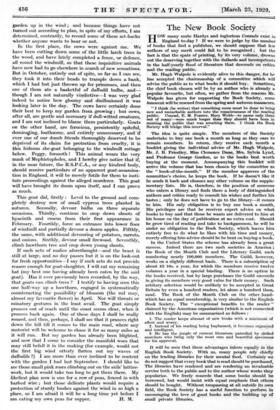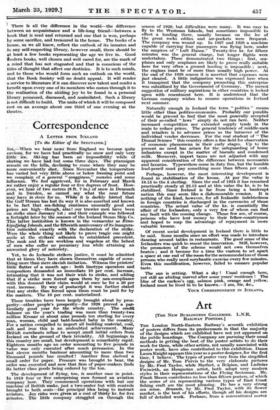The New Book Society
HOW many mute Ilardys and inglorious Conrads exist in England to-day ? If we were to judge by the number of books that find a publisher, we should suppose that few authors of any merit could fail to be recognized ; but the fact is that the spate of printing, by its very volume, drowns out the deserving together with the dullards and incoMpetents in the half-yearly flood of literature that descends on critics -and- the reading- public. • Mr. Hugh Walpole is evidently alive to this danger, for he has accepted the chairmanship of a committee which will advise the public as to what books it should buy. Sometimes the chief book chosen will be by an author who is already a popular favourite, but often, we gather from the reasons Mr.
Walpole has given for supporting the Book Society, some innocent will be rescued from the spring and autumn massacres.
" I think (he writes) that something more must be done to' bring new and remarkable authors into the consciousness of the-reading public. Conrad, E. M. Forster, Mary Webb—to name only three out of many—were much longer than they should have been in meeting the public that was awaiting them. I think the Book Society will-bridge this interval."
The idea. is quite simple. The members of the Society undertake to buy one book a month as long as they care to remain members. In return, they receive each month a booklet giving the individual advice of Mr. Hugh. Walpole, Mr. J. B. Priestley, Miss Clemence Dane, Mrs. Sylvia Lyndi and Professor George Gordon, as to the books best worth buying at the moment. Accompanying this booklet will arrive the volume that has been chosen by the committee as the " book-of-the-month." If the member approves of the committee's choice, he keeps the book. If he doesn't like it he sends it back and chooses any other volume on the supple- mentary lists. He is, therefore, in the position of someone who enters a library and finds there a body of distinguished authors and critics ready to consult his wishes and further, his tastes ; only he does not have to go to the library—it comes to him. His only obligation is to buy one book a month, His privileges are that he receives expert advice on what books to buy and that those he wants are delivered to him at his house on the day of publication at no extra cost. Should he grow tired of reading and take to backgammon, he will be under no obligation to the Book Society, which leaves him entirely free to do what he likes with his time and money, merely offering him advice should he be bent on buying a book.
In the United States the scheme has already been a great success. Indeed there are two such societies in America ; the Book of the Month Club and the Literary Guild; each numbering nearly 100,000 members. The Guild, however, works on a slightly different basis. There is a subscription of about £3 10s. a year, for which the members receive twelve volumes a year in a special binding. There is no option in the books received, but by large purchases the Guild succeeds in giving its members very good value for their money. Such arbitary selection would be unlikely to be accepted in Great Britain by even a hundred readers, let alone a hundred thou, sand. The Book of the Month Club on the other hand- which has an equal membership, is very similar to the English Book Society. The " exceptional benefits to the reader" claimed by the organization (which is not connected with the English) may be summarized as follows :
1. The reader keeps abreast of new books with a minimum of effort and worry. 2. Instead of his reading being haphazard, it becomes organized 3. He has the jungle of current literature patrolled by skilled searchers who bring only the meet rare and beautiful specimens for his approval.
It will be seen that these advantages inhere equally in the English Book Society. With us, many people rely chiefly on the lending libraries for their mental food. Certainly we do not suggest that every bookthat is read should be purchased, The libraries have rendered and are rendering an invaluable service both to the public and to the author whose works they popularize. We freely concede that some. books should be borrowed, but would insist with equal emphasis that others should be bought. Without trespassing at all outside its own field, the Book Society has a useful function to perform in encouraging the love of good books and the building up of small private libraries. There is all the difference in the world—the difference between an acquaintance and a life-long friend---between a book that is read and returned and one that is won, perhaps by some sacrifice, and treasured in the house. The books of a house, as we all know, reflect the outlook of its inmates and in any self-respecting library, however small, there should be at least a few books representing the age we live in. Good tiodern books, well chosen and well cared for, are the mark of a mind that has not stagnated and that is conscious of the tides of thought that affect our destinies. It is to such minds, and to those who would form such an outlook on the world, that the Book Society will no doubt appeal. It will render -a service to literature if it can discover new talent and confer a benefit upon every one of its members who comes through it to the realization of the abiding joy to be found in a personal library possessed, discussed, and assimilated. Such a library is not difficult to build. The units of which it will be composed cost on an average about .one third of one evening at the theatre.

















































 Previous page
Previous page